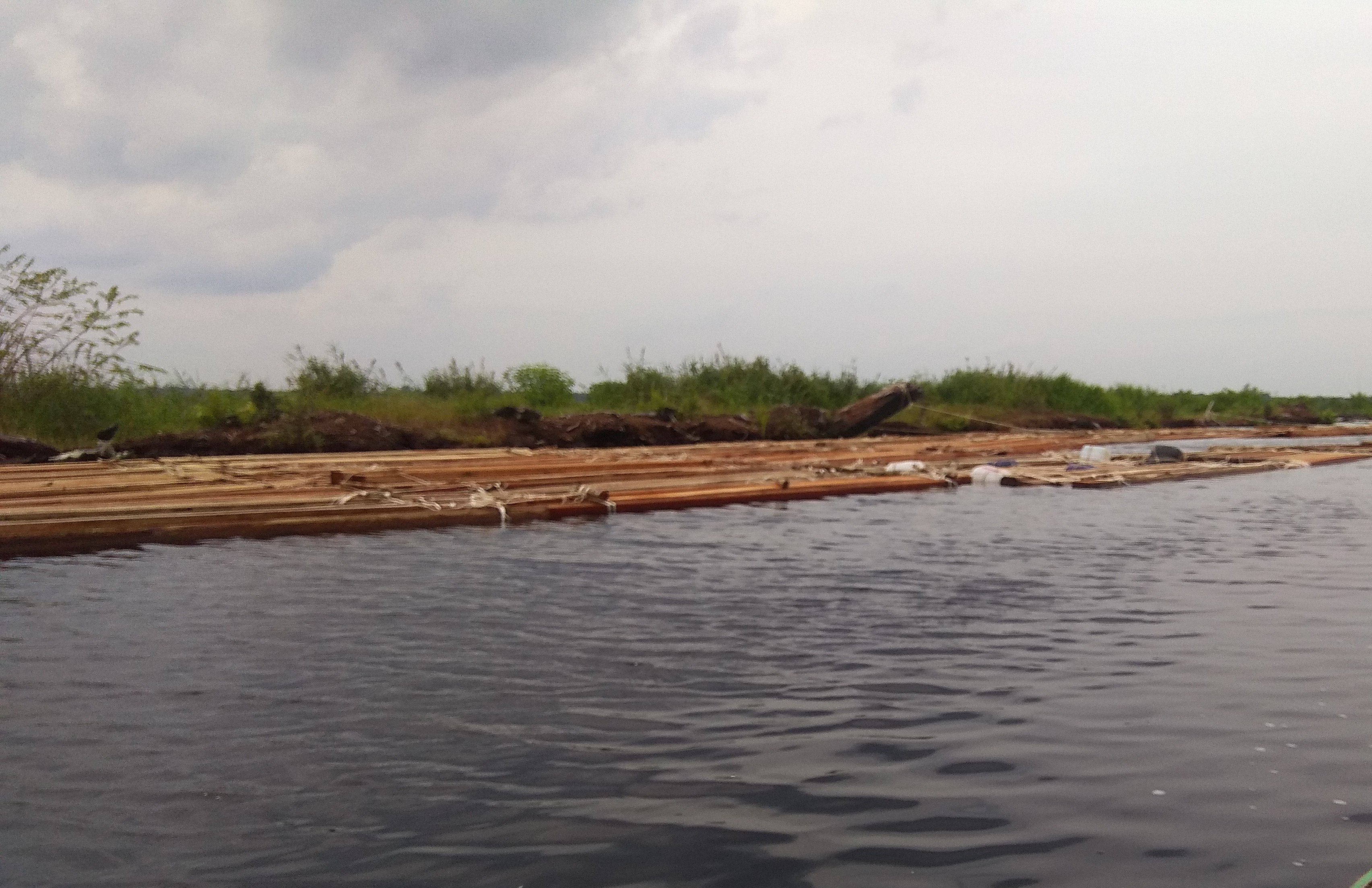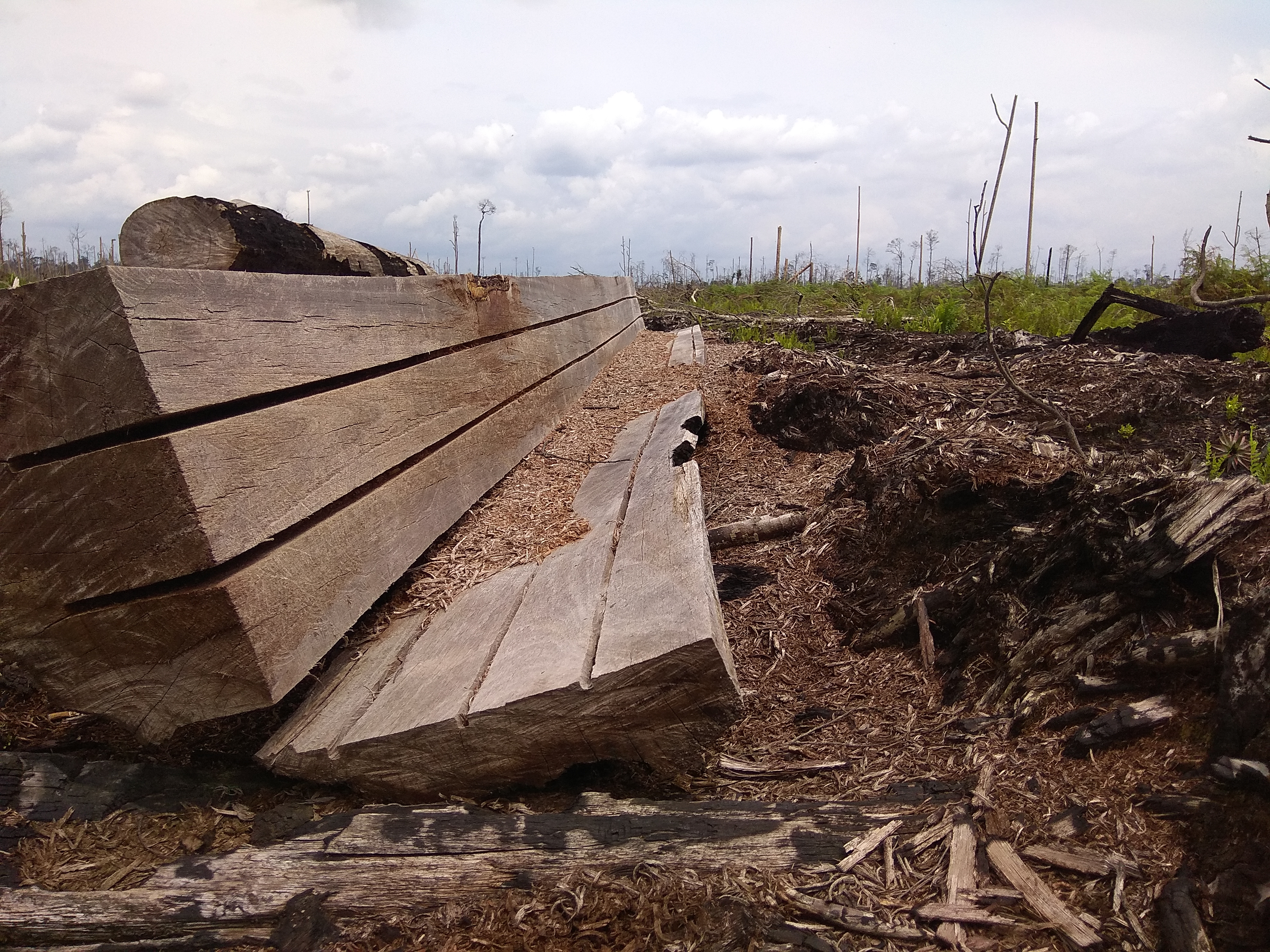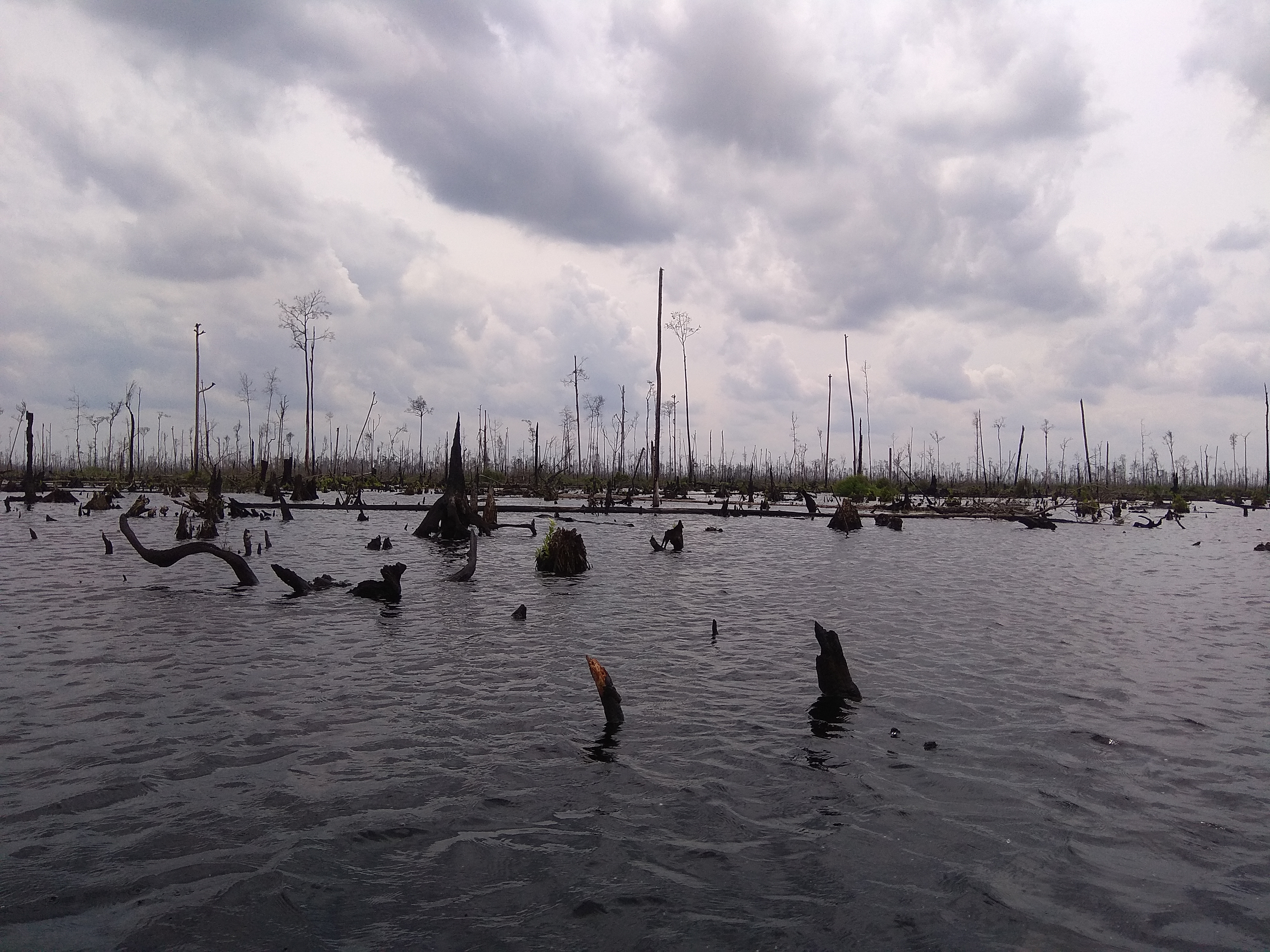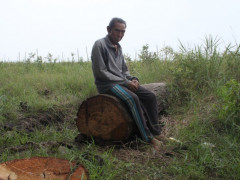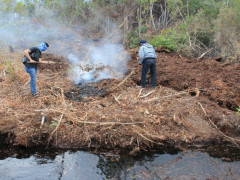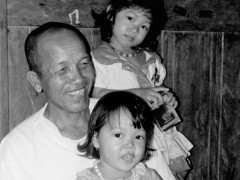Riding Village's Lost Treasure
By Parliza HendrawanDisregarding Peat Restoration causes Company Concession Areas to be Prone to Repeated Fires
That afternoon, Sarkim rushed to the edge of PT Sumbertama Nusa Pertiwi’s (SNP) oil palm plantation canal in Arang-Arang Village, Kumpeh Sub-District, Muaro Jambi District, Jambi Province. Across the canal, the pineapple plantation belonging to the residents of Sipin Teluk Duren Village caught fire. Strong winds caused the fire to quickly engulf the peatlands.
"It hasn't been an hour and the fire has spread over 300 meters," said Sarkim, Head of the Fire Care Community (MPA) in Arang-Arang Village, reminiscing about the fire that occurred in August 2019.
In less than a day, the fire had spread to two kilometers and burned down the residents' plantations. A total of 1,951 hectares of oil palm plantation area belonging to PT SNP was burned down in the 2019 dry season. The hot weather and dry peat conditions forced the forest and land fire personnel to work hard to extinguish the fire, which has a tendency to persist. "From above, the fire seems to have been extinguished. But underneath, the fire below is still burning," said Sarkim.
The fire embers in the peat continue to move uncontrolled. In addition to PT SNP, PT Mega Anugrah Sawit (MAS) also manages more than 2,797 hectares (ha) of peatland in the same area, adjacent to the community's plantations which were also burned. The peat fires caused Sipin Teluk Duren Village and Arang-Arang Village to be engulfed in thick smoke.
Lutpiyah, a resident of Arang-Arang Village, admitted that she had been coughing and had a fever for two weeks because of the haze. "At night, I experienced shortness of breath, coughing, difficulty sleeping," she said.
Fires also broke out in the oil palm plantation owned by PT Bara Eka Prima (BEP) which is located in the same area as PT MAS. The two companies are located in the Batanghari River-Air Hitam Laut River Peat Hydrological Unit (KHG).
The fire continued to smolder for days under the peatlands’ surface and destroyed more than 2,300 hectares of PT BEP's oil palm plantation. PT BEP claimed that the fire started from the area of PT Pesona Belantara Persada (Pesona), a company that holds a Forest Concession Rights (HPH) adjacent to PT BEP. The high rate of illegal logging activities is suspected to be the cause of the fire.
"The fire was likely caused by people cutting wood inside of PT Pesona’s area," said Ruslan, a resident of Betung Village. More than two hectares of his rubber plantation also burned down in September 2019. At that time, the sky over Betung Village, Kumpeh Ulu Sub-District, turned red due to the peatland fires.
“It is dark here (in Betung Village), the sky is red like it is already Maghrib (after sunset), even when it is noon. There are fires (everywhere)," he said.
The Indonesian Conservation Community (KKI) Warsi records state that at least 19,477 hectares of PT Pesona's concession area burned down in the 2019 dry season. The company was considered negligent and the Jambi police carried out an investigation on the fire.
In an online discussion with Walhi Jambi, Akhmad Bestari, Head of the Jambi Forestry Office, who is also the Head of the Regional Peat Restoration Team (TRGD) in Jambi, said that the border between Jambi and South Sumatra is prone to forest and land fire. There were recurring fires in the area, especially in the HPH concession areas owned by PT Pesona and PT Putra Duta Indah Wood (PDIW).
“Our concern is that recurring fires often occur in the two HPHs. After the 2019 fires, the two HPHs are no longer active. We have reported it to the Ministry for evaluation. Because these two areas are prone to fires,” he said.
PT Pesona, based on the Minister of Forestry Decree No. SK.674/Menhut-II/2010 dated 8 December 2010, has a concession area of 21,315 hectares.
Data published by KKI Warsi shows that throughout 2019, a total of 30,137 hotspots were monitored and the area affected by land fires reached 157,139 hectares. A total of 20 company concessions areas experienced recurring fires in 2015 and 2019, including PT Pesona.
Illegal logging
The fire in PT Pesona’s concession area is suspected to have originated from illegal activities in the area. Illegal logging had been occurring even before PT Pesona obtained its HPH permit in 2010, but the illegal activities have increased after the 2019 fires. The massive illegal logging has worsened the condition of peats and made them prone to fire.
The residents of Betung Village informed that approximately 300 people are in PT Pesona’s area and have continued to cut down the remaining forest area. The perpetrators were not only local residents, but also includes dozens of migrants from Lampung and South Sumatra.
He admitted that 20 villagers act as financiers, while other financiers are from South Sumatra. “Lampung residents only play a role as loggers. Because they can cut the trees really well.” said a resident who requested to stay anonymous.
The illegal loggers can produce hundreds of cubic meters of stolen wood in a week. The wood is then brought out through the company's canal to the Kumpeh River, Muaro Jambi District, Jambi Province. These logs were then sent to the storage in Muaro Jambi and Jambi City. Some were sent to the shipyards around the Kumpeh River.
Illegal logging has been occurring in the Pesona area for years, but law enforcement efforts have not been maximized. As a result, these illegal logging activities persist and are threatening the peat ecosystem.
The Head of the Forest and Land Fire Control Section - Jambi Province Forestry Office, Donny Osmond, admitted that he had carried out a joint raid involving the Jambi Provincial Forestry Office, law enforcement officers, Jambi Police, and Korem 042/Garuda Putih in September 2020. As a result, they’ve arrested three illegal logging workers in the PT Pesona area and these people have been named suspects.
"The case has been transferred to the Muaro Jambi District Attorney's Office," he said via WhatsApp.
Donny said that follow-up operations will be carried out to eradicate the illegal activities happening in the PT Pesona concession area and that these operations would involve other stakeholders. However, they have a limited budget and have to wait for the 2021 budget to be approved.
Not Implementing Restoration
In early December 2020, PT Pesona’s concession area was flooded. According to the residents, the peat area with the HPH permits is often flooded during the rainy season and experiences drought during the dry season.
Several blocking points in the canal were built to maintain the water level but have been damaged and some have been burned. Pantau Gambut did not find any monitoring towers or any effort from the company to restore the peatlands. There was only a wide area of burnt land and molting wood.
Rudiansyah, Executive Director of Walhi Jambi, said that PT Pesona has not made any effort to submit its annual work plan (RKT) for the last five years. Based on Pantau Gambut’s investigation, the last time PT Pesona submitted their RKT permit was in 2016.
Rudi said that the land owned by PT Pesona and PT PDIW is burning almost every year. However, the most widespread fires occurred in 2015 and 2019. “These companies (PT Pesona and PT PDIW) are not ready to operate, they do not have any facilities and infrastructure, as well as the human resources to control forest and land fires. Moreover, these companies do not conduct any (peat) restoration effort,” he said.
He urged the government to take firm action against the two companies, due to concerns of recurring fires. "This can no longer be tolerated. The permit must be revoked or strictly reviewed. Companies that are unable to control forest fires must be immediately shut down,” said Rudi.
The company's lack of awareness in restoring peat can trigger recurring forest fires and persistent haze. Moreover, the peatland in Jambi has been damaged due to the burden caused by numerous concession permits. Walhi Jambi’s data states that 70 percent of the total 617,562 hectares of peatland in Jambi have been granted oil palm plantation concession permits and Industrial Plantation Forests.
Feri Irawan, Coordinator of Jaringan Pantau Gambut Jambi, said that the construction of thousands of canals in the company's concession areas has caused the peat to dry up and become damaged. As a result, the residents’ agricultural land which is located around the concession area, experiences prolonged flooding during the rainy season and drought during the dry season. The recurring fires, especially in peatlands located in company concessions areas have left a bad track record that must be immediately evaluated by the government.
“The government must conduct a comprehensive evaluation and take firm action. Companies that are negligent and ignore their responsibilities should have their permit revoked to stop recurring forest and land fires," he said.
Restoration Challenges
At least 20 company concessions areas are experiencing recurring fires in 2019. According to Walhi Jambi, a total of 7 companies have been prohibited to operate by the law enforcement division of MoEF, and 12 companies, which include PT Pesona and PT PDI, were investigated by the Jambi police in relation to the forest and land fires. Two companies, PT MAS and PT Dewa Sawit Sari Persada, were finally named as suspects.
The results of WALHI's field observation of the 7 companies in the Peatland Restoration Indicative Map (PIR), i.e. PT Bara Eka Prima, PT Puri Hijau Lestari, PT Ricky Kurniawan Kertapersada II, PT Jambi Batanghari Plantation, PT Sumbertama Nusa Pertiwi, PT Metro Yakin Jaya, PT Kaswari Unggul, shows that not all of them have canal blockings, monitoring towers, and adequate infrastructure, which makes them prone to recurring fires.
Bambang Yulisman, Head of Planning and Forest Utilization from the Jambi Province Forestry Office, admitted that it is difficult to monitor peat restoration in the company's concessions areas due to limited authority.
"We can only give suggestions but the actual execution (restoration) must be done by the permit holder," he said.
In his opinion, the repeated fires are caused by a lack of comprehensive restoration efforts carried out in a KHG. “Restoration is being carried out here (outside the concession areas), but no restoration effort is carried out inside the concession areas. This requires a joint effort, companies must be involved in the restoration,” said Bambang.
However, as of 2020, Bambang claimed that the Jambi Provincial Government had successfully restored 200,772 hectares out of a total of 617,562 hectares peatland area in Jambi that was targeted for restoration by the Peat Restoration Agency (BRG).
One of the examples he provided is the canal blocking built in the peat area of Orang Kayo Hitam Forest in the Sungai Kumpeh-Air Hitam KHG, which has successfully re-wetted the peatland even though the area was still burning during the dry season in 2019.
"The area was burnt in 2019, but only the top sections. The fire did not burn all the way down like in 2015. Because the peat was already wet, we built canal blockings at several points and used concrete so it's durable," he said.
As of mid-2020, the Jambi Provincial Forestry Office has built 418 blocking canal units as an effort to re-wet the peat to make it more resilient to fire. A total of 466 wells have been drilled to help extinguish forest fires.
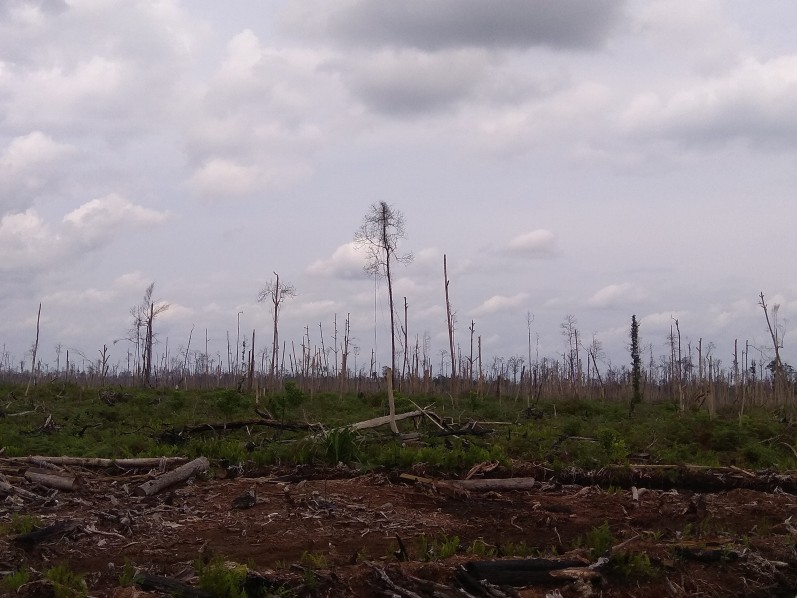
_.gif)
_.gif)
